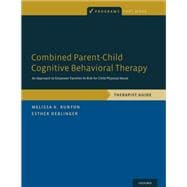Violence is an epidemic that negatively impacts children across their lifespan. Reports indicate 2.1 million youth have experienced physical abuse during their lifetimes, disrupting the healthy development of children from the toddler years through adolescence, and most cases involve parents. Some parents lack the skills to effectively parent and use physical discipline as a strategy to control their children's problem behaviors. They may use increasing force if children continue to be noncompliant, which places many children at-risk for harm.
Combined Parent-Child Cognitive Behavioral Therapy (CPC-CBT), created by Melissa K. Runyon and Esther Deblinger and outlined in this guide, provides an evidence-based intervention aimed at empowering families to develop optimistic outlooks on parenting and peaceful home environments, and to decrease stress experienced both by parents and children. CPC-CBT incorporates elements from empirically supported CBT models for families who have experienced physical abuse, sexual abuse, and domestic violence; additionally, CPC-CBT draws on concepts from developmental theory, learning theory, family systems theory, and motivational interviewing. The target population includes children (ages 3-17 years) and their parents/caregivers who have already engaged in or are at-risk for physically abusive behavior towards their children. This manual is for clinicians, clinical supervisors, administrators, and others who are considering the implementation of CPC-CBT in their agencies with families at-risk for child physical abuse.








